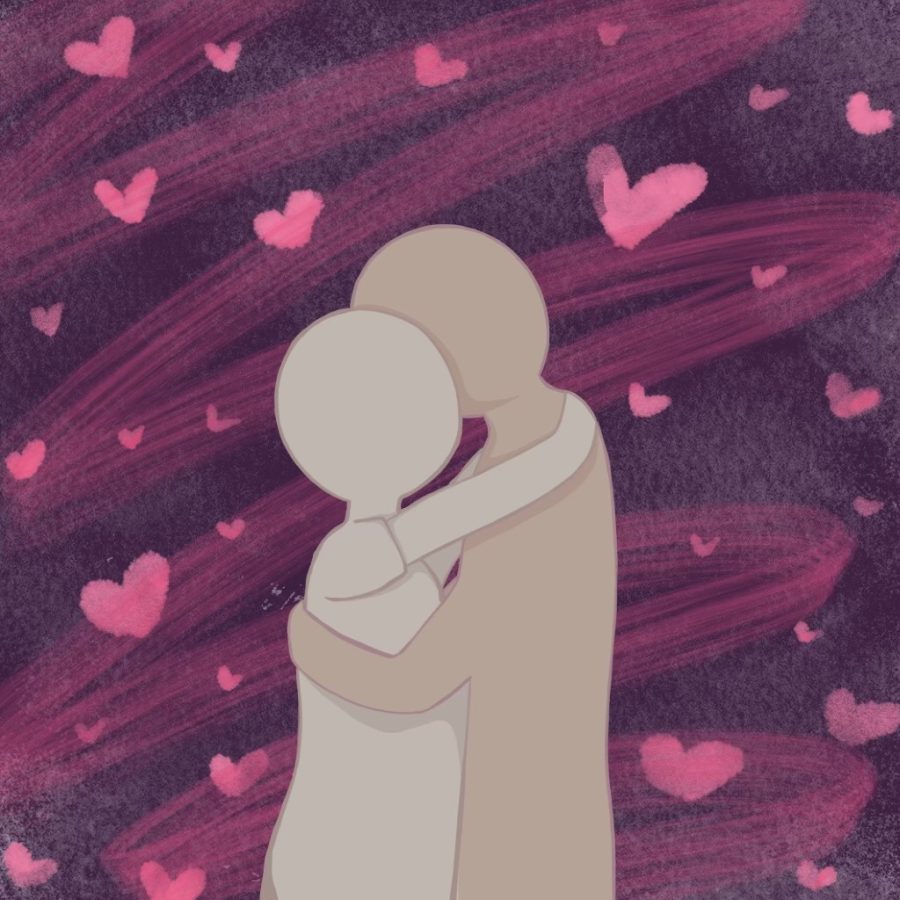Can You Really Fall In Love In High School?
May 15, 2023
There is nothing more disenchanting than the “high school experience.” Movies and books will portray these four years as magical, dreamy, all that you could ever want – but forget about the social stress, the academic stress, and not to mention, the fact that high school is just… hard. Unfortunately, it is not all football games and dances. It is not all romantic moments where everyone around you disappears, where your surroundings get fuzzy and time stops as the love of your life approaches you with flowers, chocolates, and a well-rehearsed promposal. Dating in high school is common, fun, and informative, but can you really fall in love before you are even 20 years old?
After one serious relationship and a few short lived talking stages (where you both are exclusively talking only with each other but there are no labels), I can safely say that dating in high school is not what it is chalked up to be. No offense to the girls I am referencing here, of course – we are all too young, immature, sensitive, and inexperienced. Of course, you only improve in these aspects through participation, and high school is considerably the perfect time to do so. The Phoenix says that “having a relationship in high school can allow you to grow and develop as a person… prepare you for the future and make it easier to develop long-lasting relationships by strengthening important qualities like your ability to communicate, respect and trust your significant other.” The experience you gain from being in a high school relationship, regardless of if you can define it as a talking stage or a true connection, is invaluable. You learn how to define your boundaries, what those boundaries are, improve your communication skills, and overall, will learn more about yourself in every aspect. But, how many people actually get the chance to develop these skills with someone else? I posted a poll on Instagram asking how long my followers’ longest high school relationship was. I received 50 responses, ranging anywhere from one day to four years. The average of these results was 14.84 months. I was quite surprised to see that the average came out to over a year, especially because according to The Register, “98% of high school relationships fail.” This staggering number is not totally surprising when looked at from a broader standpoint than the few couples you see holding hands and kissing in the hallways before it is even 10:00 am.
That circumstance is extremely unique – most of the time, high school students do not feel like they even have time to date, or at least for anything substantial. The Tide explains that “with all the responsibilities you have in high school, such as homework, extracurriculars, and maintaining other friendships, it is sometimes difficult to manage everything,” and dating would only add yet another responsibility to the list; however, dating could also be a positive catalyst for academic performance. Sophomore Ruthie Wang, who has been with her current girlfriend for over a year, says that being in a relationship motivates them to do better and that she and her girlfriend “keep each other accountable” to get their work done. Junior Julia Wang agrees, suggesting that a partnership could also “help each other on topics that the other one is better at.” But, Julia Wang believes that, overall, a relationship is more of a distraction from academics than a benefit. Ruthie Wang also addresses the opposite side, commenting, “It can be distracting when you are texting in class.” Whereas it is easier to go at your own pace doing work at home, falling behind in class due to the temptation of your phone blowing up with notifications from someone you would much rather be talking to is only detrimental in the long run. While I think everyone can agree that talking to a partner is way better than trying to understand stoichiometry or what exigence means, these are two painfully crucial topics that we learn in high school and letting a relationship get in the way of instruction on those topics is only going to hurt you when the test comes back. Overall, from an academic standpoint, relationships walk a very fine line between beneficial and ruinous. As with everything in life, balance is key, and as long as your Canvas dashboard is not overflowing with missing assignments, it is possible to successfully work a relationship into your list of priorities.
But what else comes with high school romance aside from a longer list of responsibilities and a possible threat to understanding whatever is going on in class? Well, when referencing a study done by UCLA, The Tower Pulse reports that “teenagers in some dating relationships report higher levels of self-esteem and self-confidence and perform well in school.” High school is an insecure time: these years are gray clouds of self doubt, angry criticisms in the mirror, and unfair comparisons to classmates with silver linings of everything we were hoping for – first loves and school spirit. Noticing an increase in self esteem levels due to dating is an easy reason to encourage every student to go for it. Dating is undeniably fun and new and I cannot say I am totally for or against dating in high school. Being absolutely on either side would be incredibly hypocritical of me. However, in regards to love at this age, I am a pessimist, and I find it a little harder to present falling in love in high school as this grand, fantastical concept that no one’s high school experience is complete without. I cannot say that I have ever been in love, but then again, I guess I do not know what that is supposed to feel like. I have seen my friends fall so hard that they end up tumbling into heartbreak as many times as I have seen them find something worth fighting through the tribulations of adolescence with. Which brings me back to the question that inspired this entire article: can you truly, undoubtedly, and wholly fall in love in high school? For senior Hannah Gaffney, who has been dating senior Jake Scalzo for almost a year, love is exciting and simply makes her happy. However, these two have known each other for years, and the close relationship they built from the time they spent together as friends allows them to have “an extenuating circumstance.” Scalzo and Gaffney clarify that they “cannot speak for every high school relationship, but for [them], it was possible [to fall in love].” Ruthie Wang explains that falling in love could be possible, but “it takes a lot of time… there is a difference between having a crush and thinking you both will be in love in the future.” Infatuation is a feeling often mistaken for love – the new attachment to someone that feels so strong and dependable, as if you have known each other and been in love for years, when really it could have only been a month. Julia Wang does not even think that falling in love is possible at this age, claiming that “there is so much to learn and live after high school, so many experiences and values you have not developed yet,” which are vital components of personality that hold one back from genuine love. Freshman Evan Jackson is also hesitant to agree, saying that it is possible, “but very rare.” Nonetheless, whether you believe high school is the perfect time to find true love, are a bit more like me and do not know where you stand, or are absolutely positive on its impracticality, high school is an experience in and of itself. Do not let whether or not you get a showstopping, jaw dropping Homecoming proposal that puts the best theatrical performances to shame define your four years: it is all so much more than that.



